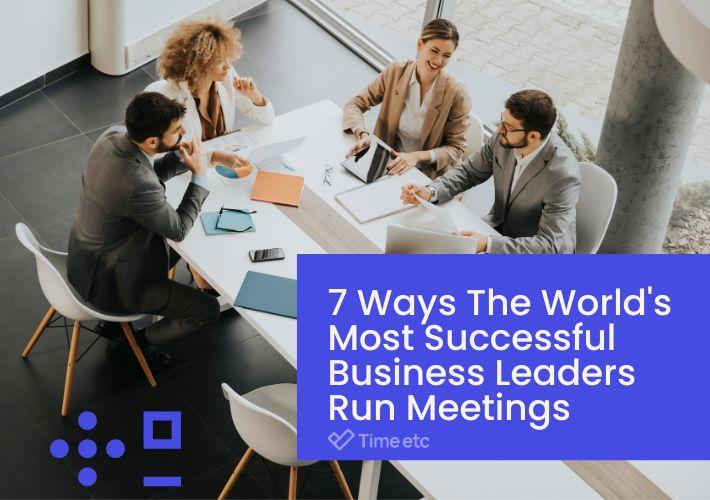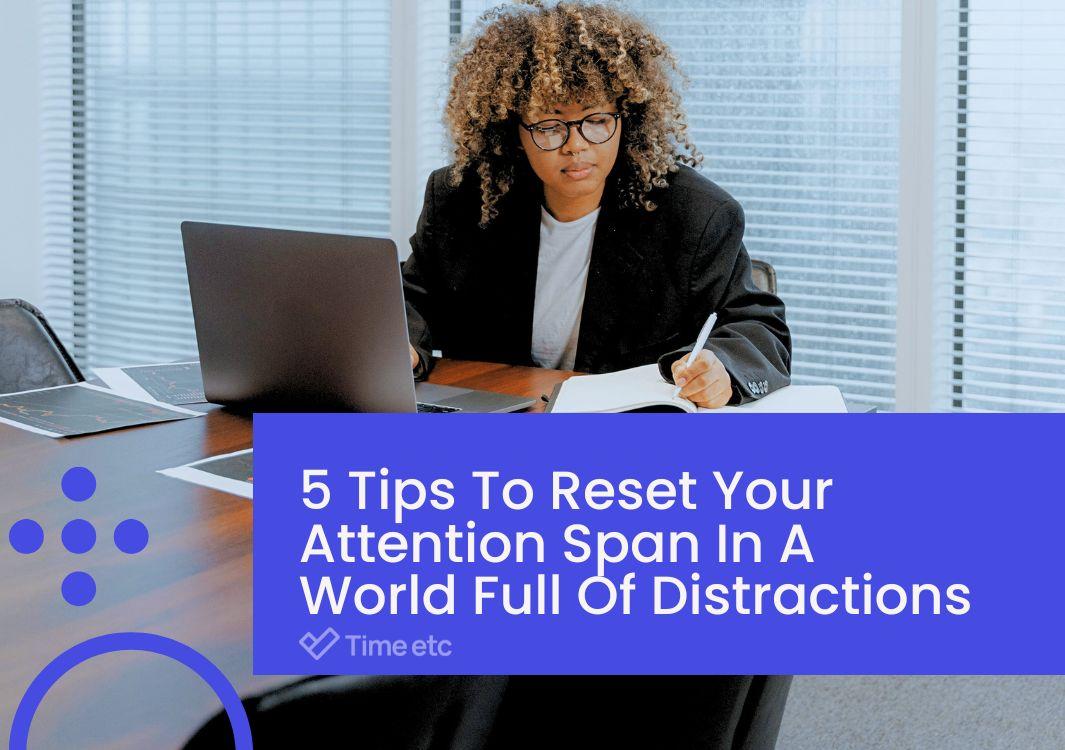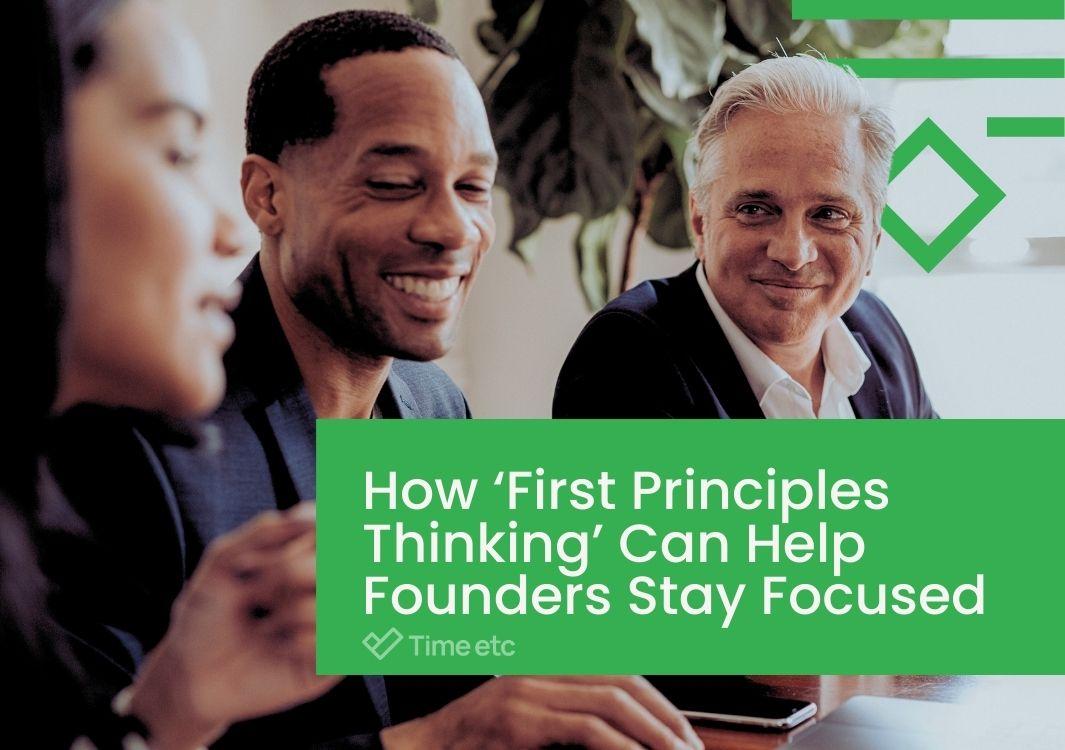Did you know that 11 million meetings take place in the U.S. every day, adding up to over 1 billion each year?
Yet, despite such frequent occurrences, only 30% of these meetings are actually productive. This inefficiency has a costly downside, with an estimated $37 billion lost annually due to unproductive meetings.
As a busy entrepreneur or small business owner, every minute counts. Time is your most valuable asset, and spending it in ineffective meetings is a luxury you simply cannot afford.
So, this begs the question: How can you make sure your meetings are as productive as possible to help your business grow and thrive?
Well, who better to ask than some of the world’s most renowned business minds?
People like Richard Branson, Elon Musk, and Jeff Bezos didn't become the best of the best by accident—they've carefully honed their time management skills and refined their meeting strategies to maximize productivity and drive results.
Below, we'll explore the tactics that these legendary leaders use to make their meetings work for them.
Let's get started!
1. Keep meetings small - Steve Jobs
Steve Jobs, the visionary behind Apple's rise to one of the world's most valuable companies, was known for his minimalist approach—not only in product design but also in conducting meetings.
His philosophy was clear: keep meetings small to keep them productive. He believed overcrowding meetings with too many participants muddled clarity and impeded decision-making.
One striking example of Jobs' commitment to this principle occurred during a regular meeting with Apple’s advertising agency. Noticing an unfamiliar face, Jobs interrupted the meeting to ask what she was there for. Although she was involved in some related marketing projects, Jobs politely but firmly asked her to leave, explaining that her presence wasn't necessary.
Jobs applied the same standard to himself, famously declining an invitation from President Obama to attend a meeting of tech leaders, citing the lengthy guest list as his reason. He argued that a smaller group would likely be more productive, avoiding the "sea of noise" that large gatherings often generate.
For entrepreneurs and small business owners, the takeaway here is pretty straightforward: Fewer people can help you stay focused and make decisions faster, so think carefully about who you invite. All meeting attendees should have a clear reason for being there and a specific role to play.
This way, your meetings will be productive and efficient instead of dragging on needlessly. If someone doesn't need to be there for the whole meeting, they can easily be briefed afterward.

2. Follow a strict agenda - Sheryl Sandberg
Sheryl Sandberg, the former chief operating officer of Facebook, is a testament to the power of organization in making meetings more effective.
She adopts an approach where every meeting operates under a strict agenda. Sandberg is known for carrying a spiral-bound notebook to all her meetings, which contains a list of handwritten discussion points and action items
One report says that Sandberg tackles these items one by one, crossing each off as they are completed. Her rule is simple: once she checks off all items on the list, the meeting ends—whether it's been 15 minutes or 50.
If you want to make the most of your day, it's crucial to have a well-structured agenda for each of your meetings. When you know what you want to accomplish beforehand, it helps keep the discussion on track and moving towards your goals.
3. Cut your meeting time in half - Gary Vaynerchuk
Gary Vaynerchuk, chairman of VaynerX and a renowned serial entrepreneur, is famous for his direct and efficient approach to business. This philosophy also extends to his meeting management style, as he believes that most meetings can be accomplished in half the time they're typically set for.
Similar to Sheryl Sandberg's approach, his reasoning is that it encourages participants to concentrate on what really matters, without wasting time on unnecessary conversation. This way, every minute is put to good use and the session becomes much more efficient.
In a Medium article, Vaynerchuk explained, "If I have an hour meeting with my team, we will fit everything we need into the hour. We'll banter a bit and talk about a few things we didn't plan on talking about. But if we cut that same meeting to 30 minutes, we'll still accomplish everything that needs to be done, hands down."
Imposing stricter limits on meetings creates more disciplined, focused interactions that can lead to quicker, more decisive actions.

4. Say goodbye to PowerPoint presentations - Jeff Bezos
Have you ever sat through a presentation and it's like the ideas just glided over your head without really sinking in? Amazon founder Jeff Bezos knows this all too well.
If you want to pitch an idea at Amazon, Bezos prefers detailed narratives over PowerPoint presentations.
Instead of slides, team members must create a four- to six-page memo for everyone to read. Bezos introduced this idea way back in 2004, and it helps everyone to truly understand the content before they start discussing it.
Bezos argues that "PowerPoint-style presentations somehow give permission to gloss over ideas, flatten out any sense of relative importance, and ignore the interconnectedness of ideas."
He believes that his "narratives" approach helps create a clearer and more structured thought process that emphasizes how ideas are linked together and makes sure nobody misses the bigger picture. And by taking some time to read together at the start of the meeting, everyone starts off on the same page—both literally and figuratively!
When preparation and thoughtful consideration are the main focus, meetings become more than just regurgitating information. Taking a leaf out of Bezos's book can boost the quality of your team's discussions and decision-making, creating more valuable meetings where everyone is well-prepared, focused, and eager to delve into the topic at a deeper level.
5. Try a change of scenery - Richard Branson
Virgin Group founder and owner Richard Branson has always been a big believer in thinking outside the box (or boardroom, in this case!) when it comes to meetings.
In one of his LinkedIn posts, he suggests that switching up the typical setting of a meeting can not only increase productivity but also spark creativity.
Whether it’s a stand-up meeting, a walking meeting around the block, or even a gathering at the park, Branson believes that a fresh environment can lead to quicker decision-making and more vibrant, engaging interactions.
Shifting your meetings to a different environment can break up the monotony and stop you from zoning out during those PowerPoint presentations—which, like Bezos, Branson is not keen on. But by getting out of that same old routine, we can stay engaged and alert.
Branson's strategy is a valuable reminder that setting can play a crucial role in shaping the meeting's tone and outcomes. Holding meetings in unconventional or informal settings can help break down formalities and encourage more open discussions and sharing of ideas.
This strategy has the potential to take your meetings to the next level, making them not just more productive but also more enjoyable for everyone involved.

6. Leave if you aren’t adding value - Elon Musk
Elon Musk, CEO of Tesla and SpaceX, is renowned for his unapologetic and intense approach to running his companies.
One of his more striking policies on productivity involves a simple rule for meetings: if you're not adding value, leave.
In a widely circulated email to Tesla employees, Musk wrote, “Walk out of a meeting or drop off a call as soon as it is obvious you aren’t adding value. It is not rude to leave, it is rude to make someone stay and waste their time.”
According to Musk's recent biography, he put this principle into practice by walking out of a meeting with a group of Russians who doubted his serious intentions about purchasing rockets.
While this may be one of the least socially acceptable strategies on this list, it does hold some merit. After all, your time is precious.
However, you might not feel comfortable standing up and walking out of a meeting room, or abruptly leaving a Zoom call, so it's worth asking yourself ahead of time how your attendance at a meeting could make a positive impact on its outcomes. In other words, is your presence really necessary in the first place?
If it's not a firm "Yes," you could politely decline to attend. Alternatively, you could request that someone attend on your behalf, such as a virtual assistant (VA). They can take notes and relay important information back to you so that you're always in the loop.
This approach keeps meetings focused on getting things done, not just on going through the motions. It's a win-win situation for everyone involved.
7. Avoid meetings at all costs - Oprah Winfrey
Oprah Winfrey, a media mogul and entrepreneur, has always been selective about how she spends her valuable time. So in her opinion, "less" is definitely "more" when it comes to meetings.
She believes that sometimes meetings can be more trouble than they're worth, and suggests exchanging detailed emails instead.
This commitment to efficiency was evident during a conversation with Coretta Scott King. When Mrs. King proposed flying out to discuss a project, Winfrey suggested a phone call instead. The outcome would be the same regardless of whether they met face-to-face, so why not save themselves the hassle?
This particular conversation highlights her belief that it's possible to make decisions and move forward without wasting time on unnecessary formalities. For busy entrepreneurs, this can be a valuable lesson to keep in mind.
If a meeting isn't absolutely necessary, an email or a phone call might just do the trick. This approach can help you streamline your schedule and show others you value their time too.

What’s the bottom line?
Successful entrepreneurship goes hand-in-hand with successful time management. If you want to make the most out of every minute and hour, it's worth taking a look at how you handle meetings as a business owner.
Luckily, you don't need to completely overhaul your whole schedule to see results. With just a few tweaks, you have the ability to transform what used to be tedious time-drains into productive and powerful sessions. You can unlock extra hours in your week, enhance your team's focus, and make decisions quicker than ever before.
But why limit yourself to just optimizing meetings when you can increase your efficiency across the board?
Time etc is here to help.
Since 2007, we've helped over 22,000 business owners and high-level executives feel more organized and in control of their work by matching them with the best virtual assistants for their needs—saving them up to 90% compared to hiring a full-time, in-house assistant.
Curious to see the difference for yourself?
Speak to our expert team to get started, and we'll handle the rest! We'll match you with a skilled virtual assistant based on your unique business needs, so you can start doing more of what matters most.
Still on the fence?
Try us out for free today!











